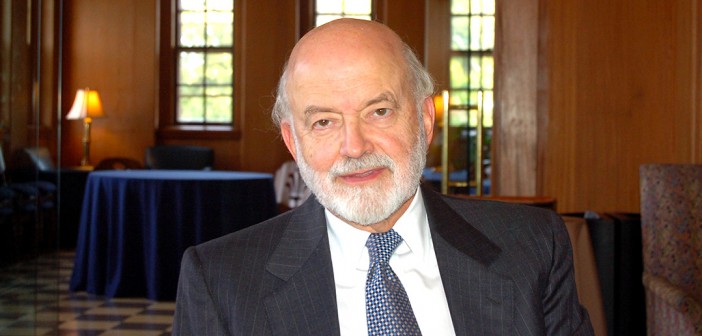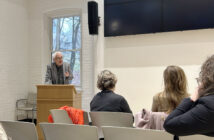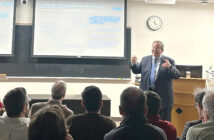The Holocaust is well known in history, but what much of society doesn’t know is the untold story of the Italians that helped rescue Jews and other refugees escaping from the Nazis during World War II. Joseph Perella, ’64, is the executive producer of “My Italian Secret: The Forgotten Heroes,” a documentary focusing on Italians that saved thousands during this period of time. Lehigh showed a screening of the movie and hosted a panel discussion with key contributors to the film on October 22. The Brown and White sat down with Perella to discuss his role in producing the movie.
Q: Can you give a brief overview of what the movie is about?
Joseph Perella: It’s a movie about Italy and the Holocaust and how actions taken by ordinary citizens protected fellow human beings. The Italian’s efforts helped save 80 percent of the Jewish population in Italy and most of the 10,000 foreign Jews who escaped Italy in the ‘30s. The overall theme, you might say, is that if you’re not indifferent to a situation when it’s in front of you, you can make a difference in the outcome.
Q:How did you get involved with the movie?
JP: It truly was a chain of serendipitous events. Twenty-two years ago, a movie called “Schindler’s List” came out and it told the story of how Oscar Schindler protected 1,200 Jews during the Holocaust by using them in his factory to make material for the Nazi war machine. Shortly thereafter I read an article by Dorothy Rabinowtz entitled “An Army of Schindlers from Italy.” It spoke of the flawed hero saving people, but there were rescuers whose exploits hadn’t been heard nor are they known. I said “Wow! As an Italian American – my parents came from Italy – I should be really proud of this, but no one knows about it.” I asked myself “What can I do about it?” In 2006 I was an honoree at a Columbus Day celebration. A woman came up to me at the event and tapped me on the shoulder. “You’re Italian?” she asked me. “Yes,” I said. “You’re an honoree?” “Yes.” “What do you know about Italy and the Holocaust?” I simply replied with the only thing I knew: “10,000 Schindlers.” And she almost fell to the floor because she was so shocked I knew about that. Four years ago I was at another dinner and the same woman that came up to me in (2006) was there. She explained to me that she wrote a book about our conversation so I had her send me it. Each chapter of the book is about someone surviving the Holocaust, how it happened, who saved them. I got really interested in the subject – basically obsessed – and called (Elizabeth Bettina, the same woman and author of the book). I said “Look, this is really some powerful stuff, but to tell you the truth, no one is going to read your book. People don’t read like they used to. I think you should make a movie about what happened because a moving image will touch more people.” I ultimately went to the Italy and the Holocaust Foundation. I explained that they have knowledge and I have people that are Italian that I can raise money from for a documentary, although none of them know anything about the issue at hand. By then I really became obsessed with the story. Anytime I met a Jewish or Italian person I would ask them what do you know about Italy and the Holocaust? Nothing. I go to a barber every two weeks to get my beard trimmed and I asked my barber the same question. When he replied that he didn’t know anything about it, I was ranting and ranting about the story. A bit later, the man in the chair next to me walks over and says that he overheard what I was saying and he makes documentaries. The guy turned out to be Oren Jacoby, a producer and director. Long story short, the foundation retained (Jacoby) to write and direct this documentary. It was a series of unplanned events, but somehow because I cared a lot about the subject, I said “OK, I’m going to do it.”
Q: Why is this film important to you?
JP: This is something that the Italians did that distinguish them from all other people. I wanted to dramatize it because it is so important to me as an Italian to learn of this heroic behavior towards ordinary people. It was a time of great violence and great evil. You have to ask yourself: How would you have behaved when faced with this moral dilemma? Would you risk your life to save a stranger? And the Italians did.
Q: What are your goals with regard to the film?
JP: I want to highlight the fact that treating people improperly isn’t a disease that goes away until people pay attention to it.
Q: Why did you decide to bring the movie to Lehigh?
JP: When I went to Lehigh, it was a compartmentalized community. Jewish people were in specific fraternities. Catholic people were in a different one. Bethlehem felt like a foreign country. I’m sure that anyone who was a member of a minority felt a bit out of touch or not a complete member of the community. So I thought, wherever it is today, Lehigh should take a step forward to unite us all. I saw this film as a great way to bring the Hillel Society, Newman Center, religion department, history department, and whoever else together to talk about our common humanity and emphasize that if you’re not indifferent, you can make a difference.
Q: How do the events portrayed in the movie relate to what is happening in the world today?
JP: What was going on in the world then is very similar to what is going on now. Kristallnacht was an event when many people decided to get out. The only problem was, if they wanted to go to America they wouldn’t be allowed in. German and Austrian Jews, however, could go to Italy without a visa. It relates to how people are fleeing ISIS. Italy didn’t close its borders. Instead it set up a camp to house refugees. Our society can learn a lot from the Italian’s heroic actions.






Comment policy
Comments posted to The Brown and White website are reviewed by a moderator before being approved. Incendiary speech or harassing language, including comments targeted at individuals, may be deemed unacceptable and not published. Spam and other soliciting will also be declined.
The Brown and White also reserves the right to not publish entirely anonymous comments.